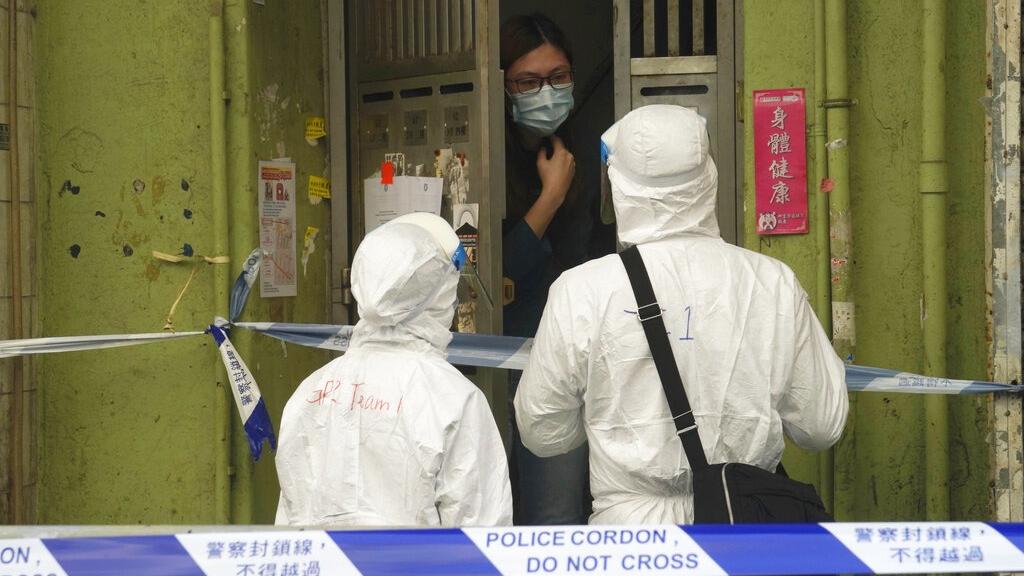 Government investigators talk to a woman living in the restricted area of Jordan neighborhood in Hong Kong, Jan 23, 2021. (KIN CHEUNG/AP)
Government investigators talk to a woman living in the restricted area of Jordan neighborhood in Hong Kong, Jan 23, 2021. (KIN CHEUNG/AP)
The Hong Kong Special Administrative Region will set up 18 community vaccination centers -- one in every district -- to each handle at least 2,000 residents a day as the city prepares to administer the COVID-19 shot developed by BioNTech SE and Pfizer Inc. as early as the end of February.
These centers will only handle the BioNTech vaccine, while the other two shots the city has ordered -- from Sinovac Biotech Ltd. and AstraZeneca Plc -- will be distributed to private hospitals and clinics, according to Thomas Tsang, a member of HKSAR’s vaccination program task force.
The vaccination centers will only handle the BioNTech vaccine, while the other two shots the city has ordered -- from Sinovac Biotech Ltd. and AstraZeneca Plc -- will be distributed to private hospitals and clinics, according to Thomas Tsang, a member of HKSAR’s vaccination program task force
ALSO READ: 11-hour Yau Ma Tei testing drive yields one positive case
The separate distribution is to avoid mixing up the vaccines, as the BioNTech shot needs to be handled at colder temperatures than the others. The HKSAR will allow people to choose their vaccine, though Sinovac and AstraZeneca’s shots won’t be available immediately since they haven’t cleared the city’s regulatory process.
The details come as the HKSAR adopts a “very careful” inoculation approach, opting for a smooth rollout rather than a speedy one to avoid any problems with supplies or possible surge in hospitalization.
“Our priority really is to have an organized program,” Tsang said in an interview Tuesday. “We try to do it as smoothly as possible, because that’s important to build public confidence. We surely don’t want something unexpected or some logistic hiccups.”
Unlike some pandemic hotspots such as London and New York, where governments are racing to inoculate their populations as quickly as possible to bring surging cases under control, the HKSAR can afford a more cautious pace. Its COVID-19 infections haven’t risen as drastically, with strict social-distancing rules keeping local cases to a few dozen daily.
ALSO READ: HK lifts restriction in Jordan after testing 7,000 people
The HKSAR won’t start jabbing its citizens until the end of February at the earliest. In an effort to prevent overburdening the city’s hospitals, the HKSAR may not vaccinate all elderly citizens and nursing homes at once, instead approaching such high-risk residents in stages.
“Once they’ve got fever, a lot of times they have to be admitted to hospital for observation,” said Tsang, former head of the Centre for Health Protection who got the nickname “superdetective” after leading a team to track the source of the SARS outbreak in the early 2000s. “We don’t want suddenly a surge of elderly home residents going to hospital.”
Officials also won’t follow the lead taken by the UK, which drained its entire initial vaccine supply on first doses, and then had to wait for more batches to give out second doses, Tsang said. A lack of supplies has emerged as one of the biggest glitches for governments trying to inoculate their citizens.
Seeking Doses
Chief Executive Carrie Lam Cheng Yuet-ngor on Tuesday said she has asked the Chinese mainland to supply more inoculations because of a “hiccup” with the city’s other vaccine orders.
ALSO READ: Cheung: HK needs to strengthen testing measures to fight virus
The city has purchased enough doses of the Pfizer/BioNTech, Sinovac and Astra vaccines to cover its 7.5 million residents, and is looking for a fourth pact to boost coverage to twice its population.
Tsang said the BioNTech vaccines, which this week became the first to be approved by the HKSAR, will arrive in batches of 1 million to 1 1/2 million doses every month, though the first batch won’t arrive until the end of February. Shanghai Fosun Pharmaceutical Group Co said Tuesday that the vaccines will be shipped directly from Germany and stored in low-temperature warehouses before being delivered to inoculation sites.
The other two vaccines haven’t submitted all the required data for starting the approval process, Tsang said.
“We expect Sinovac to submit the complete clinical trial data with all the details included,” said Tsang. “Right now, we only have bits of pieces from officials in different places, but these are not up to our scientific standard. That’s a crucial bit of information that is missing -- and the same for AstraZeneca.”
READ MORE: HK sees 81 new COVID-19 infections, tally tops 10,000
The government hasn’t set a timeline for the rollout, Tsang said. But he hopes high-risk groups such as the elderly and health-care workers can be vaccinated within half a year or earlier.
“We need to roll it out first and see what happens before we come up with some concrete idea of what target are we going to make,” said Tsang. “Definitely, we’re in for a wild ride.”


